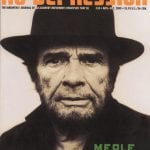Phil Cody – Scenes from a Self-made Movie
Ten-year Californian Phil Cody recalls his old stomping grounds of Cincinnati as a place with a little bit of everywhere. “Cincinnati is right on the Ohio River with Kentucky across the way [so there’s] all the river traffic bringing stuff up from the South. But yet being so very close to all the Northern cities: Pittsburgh, Detroit, Cleveland. And really not that far from the East Coast too.” He concludes, “In a way it’s East, but I guess you’d call it the Midwest.”
There’s also a melting-pot feel to Cody’s songwriting, as evidenced on his 1996 Interscope debut The Sons Of Intemperance Offering and the new, self-released Big Slow Mover. Dylanesque and early-Springsteen-style stream of consciousness make room for literary references and popular-culture name-drops alongside story songs and history lessons.
“I try to get as much scenery into the song as I can with the time and space allotted,” offers Cody. “Try to keep some action going with images and visions and whatnot that entertain me, and hope that it makes sense at the end of the day.”
To keep entertained, and challenged, he sometimes gives himself what amounts to assignments. One round of homework led to “Orphan Train”, the closing track on Big Slow Mover. The song chronicles an event from the early days of westward expansion when, amid the population boom on the East Coast, orphans were rounded up and transplanted to the Midwest for adoption. As Cody explains, it was “a classic example of finding an interesting story in the newspaper and making a story out of it.”
The penultimate “Spencer’s Song” has similar writers-workshop-inspired origins. Cody was interested in writing about his Cincy boyhood and the Kentucky Derby Day parties and mock KISS concerts in the backyard that filled it. However, he wanted to do it one step removed, looking back at himself in the third person, so he relived those days through the eyes of his neighbor and best friend. “We got beat up by the big ones and we picked on the littler ones/And the world ain’t much different today,” sings Cody through the eyes of Spencer, and it’s a line that resonates no matter whose perspective it represents.
Cody mentions three Peters as being among the artists whose work he appreciates — Case, Himmelman, and Droge — and that trio’s various flavors of folk-rock serve as a good starting point for describing Cody’s sound. From this rugged base spring the likes of the harmonica-driven power-folk gem “City Of Destruction” and the sprightly “Joyride”, just a tin whistle and concertina away from being a Pogues hit.
He also mixes in roots-hop and alt-soul a la Chuck Prophet and Joe Henry; the latter drops by to echo Cody’s alternately winsome and wizened vocals on “40 Winks Of Sleep.” “I think I made noise around town that I was his biggest fan,” a chuckling Cody says of Henry. The two eventually met and wrote a few songs together that may yet see the light of day. Also making a guest appearance on the album is Emmylou Harris, who contributes harmony vocals to a reverent cover of Townes Van Zandt’s “If I Needed You”.
Top-shelf drummer Brady Blade and co-producers Rami Jaffee (of the Wallflowers) and Ethan Johns are all gravy — albeit primo, decidedly nonlumpy gravy — but Cody mainly seems thrilled just to have another record out. The saga of Big Slow Mover is the story of how one goes from Interscope recording artist to internet DIY artist, and it’s certainly not a unique tale these days.
“When I signed to the label, it seemed to be sort of a large independent, and it very quickly became, probably, one of the biggest record companies out there,” says Cody. While he was spending two years on the road supporting The Sons Of Intemperance Offering, back at the office “internal policies or vision or whatever you want to call it was changing.”
He made the album that would become Big Slow Mover with Interscope, but they ultimately passed on it. Cody found himself the proud owner of both a new Mac and an unreleased record, and he decided to start investigating his options. His subsequent, and ongoing, journey into self-reliant business options led to the formation of his own label, Tiny Head Records, and the creation of his own website to sell the album. Another line from “Spencer’s Song” echoes where he finds himself today: “All we wanted was all that we had.”




